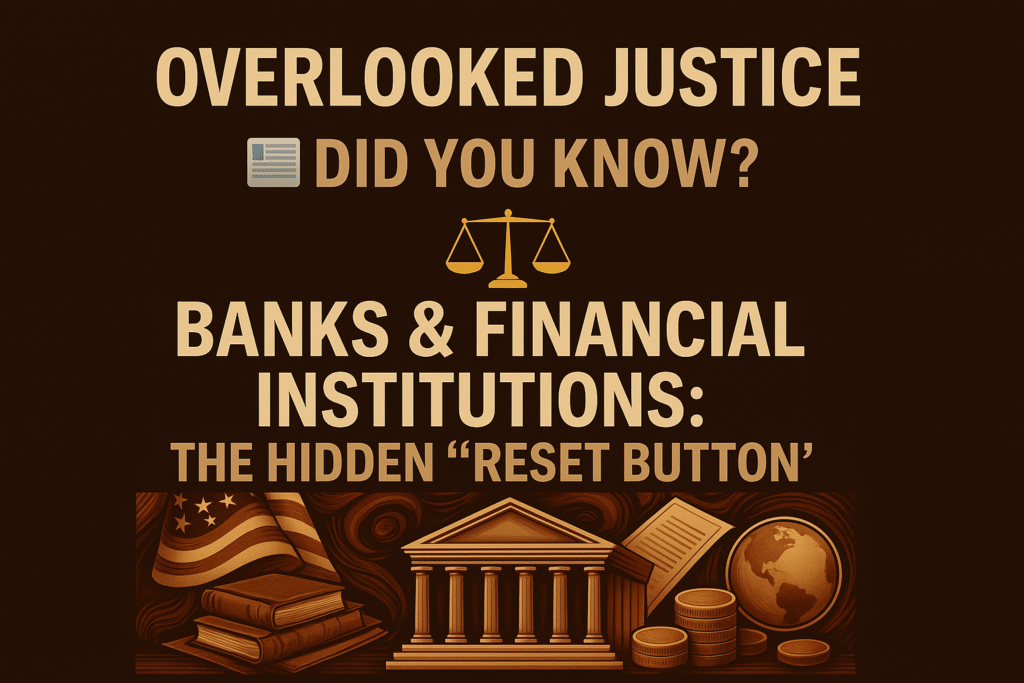A series uncovering hidden truths, overlooked facts, and untold stories that impact everyday people. From corrupt banking practices to government policies, corporate abuse, and systemic failures — we shine a light on what others ignore. Knowledge is power, and awareness is the first step toward justice.
Most people assume that when they sign up for a credit card, business card, or financing product, they are dealing directly with the bank whose name is on the card. In reality, many banks outsource these products to third-party financial companies. That means the contract you sign is often with the third party—not the bank you trust.
Why this matters: A familiar bank brand can make you feel safe, but you may actually be agreeing to terms from a different financial company with its own fee schedules, dispute policies, and credit reporting practices. These arrangements can lead to surprise denials, unnecessary credit pulls, damaging reporting, and consumer harm.
⚠️ Real Examples of Third-Party Pitfalls
- Synchrony Bank – A frequent back-end provider for retail and branded credit cards. Synchrony has faced thousands of complaints, including abrupt account closures, aggressive collection tactics, and damaging credit score impacts.📌Public Reviews:
PayPal Credit – BBB Complaints (Synchrony Bank)
PayPal Credit – Consumer Affairs Reviews - Loan Builder (Subsidiary of PayPal) – Marketed as fast small-business financing, but many consumers cite confusing repayment terms, misleading denials, and unexpected credit impacts.
📌 Public Reviews:
Loan Builder – Trustpilot Reviews - Elan Financial Services (Division of U.S. Bank) – Elan issues “white-label” credit cards on behalf of banks and credit unions. Your local bank may promote the card, but Elan is often the servicer and lender. Consumers frequently don’t realize this until after the fact.
📌 Public Reviews:
Elan Financial Services – BBB Complaints
🧾 Verified Consumer Story: U.S. Bank Application Breakdown
One consumer shared a firsthand account of how even a major bank like U.S. Bank can mishandle credit applications in ways that put a strong profile at risk:
“My credit score was an excellent 750+ when I applied for additional credit cards with U.S. Bank. I already had a business card with them for nearly two years, in perfect standing.”
- On April 9, 2025, during an in-branch meeting, U.S. Bank staff admitted they had made a processing error that caused the initial credit application to “time out.”
- To fix it, they proposed to re-run the consumer’s credit and promised to remove the first inquiry.
- However, the consumer had already received multiple generic denial letters weeks earlier, which now appeared to be cover-ups for the internal mistake.
- The bank blamed the issue on the fraud alert the consumer placed on their credit file (a smart step for protection against identity theft). But this same fraud alert had not prevented approval of their first U.S. Bank card.
- Even after years of documented transactions and visits, the bank required another in-person verification — at which point they admitted the error.
The consumer declined further applications:
“They wanted to re-run my credit to start all over again. I told them to forget it. Too many moving parts and reckless mistakes could damage my credit profile. This is how consumers end up with incorrect data on their files — caused not by negligence on their part, but by the banks.”
The Takeaway: A bank’s internal error, combined with careless attempts to “reset” the process, can create long-term credit damage and mistrust.
📌 Related: CFPB Orders U.S. Bank to Pay $21 Million for Illegal Conduct During COVID-19 Pandemic (12/19/23)
💡 How Low Credit Scores Benefit Banks & Lenders
It may seem counterintuitive, but low credit scores often benefit financial institutions:
- Higher Interest Rates → Consumers with weaker credit are charged more.
- Fee Traps → Late fees, over-limit fees, and penalty APRs generate billions.
- Dependency → Fewer options mean consumers rely on the same lenders, even when wronged.
- Debt Resale → Delinquent accounts are sold to collectors, creating new profit streams.
Bottom line: The system isn’t built to prevent mistakes — in some cases, it profits from them.
Verified Synchrony Rooms To Go Client Review
“I paid off my Rooms To Go account, which is issued by Synchrony Bank, in 2 months due to hidden terms of the merchant and Synchrony bank. A month later Synchrony bank closed my account for no reason, this action caused my great 750+ credit score to fall, and I am now looking at legal action against them. I will never use them again, even though they are used by almost every merchant in the market, they seem predatory in destroying peoples credit profiles so they can lead people to their hidden high rates and intentionally damaging there credit profiles, the reason I immediately paid my loan off.”
📣 Review that Echoes this Experience
Consumer Affairs Review (Aug. 29, 2025):
“The most shadiest company ever! I don’t know how they are still in business. Oh I guess from all the money they’ve made off of scamming their customers. Closed my acct. I kept my account in very good standing making more than double my payments every month. Never late nor behind. Then when I called to ask why was my acct closed. They tell me because of delinquent acts on my credit history. Which is total bs! I’ve paid this acct down from $5000-700. Paid off an add on to the account of $2000 in full. So I know they are scamming. There are many credit card companies and banks that would love to have me as a customer, because I pay my bills! The only reason why they closed it because I did so good with my pymts and they are unable to charge me their high interest charges.” ConsumerAffairs
🔗 See more on Consumer Affairs – Synchrony Bank ConsumerAffairs
🔗 BBB Complaints – Synchrony Bank
✅ Consumer Takeaways
- Research third-party servicers before signing — don’t assume the bank logo means that the bank is handling your account.
- Document every step (denial letters, branch visits, account statements).
- Use fraud alerts and credit freezes to protect yourself — but understand that banks may mishandle them.
- File complaints with the CFPB, FTC, and State Attorneys General when banks’ mistakes affect your credit.
- Share your story so others can recognize patterns and push for reform.
💡 Overlooked Justice Opinion:
Many people assume that putting their assets in a bank guarantees protection — but many banking practices fail to safeguard our money. Now, with some banks moving into issuing stablecoins, consumer protection is being pushed even further out of reach. Unlike bank deposits insured by FDIC (or the NCUA for credit unions), stablecoins are not federally insured, even when issued by an entity tied to a bank. If a stablecoin issuer fails, holders may lose their entire investment because there’s no government backstop.
Laws like the GENIUS Act (2025) are beginning to establish oversight for stablecoins, but they make clear that stablecoins are not FDIC-insured, and many protections remain uneven across issuers. The risks include loss of peg, liquidity runs, reserve transparency shortfalls, and regulatory gaps.
So the question is: What is the purpose of putting your asset in a financial institution that says in effect, “You have no protection” when things go wrong? Consumers need to research not just the bank, but the specific product (stablecoin, crypto, etc.) tied to it — what regulations apply, whether insurance exists, whether the issuer is trustworthy, etc.
🔎 Case Studies in Stablecoin Risk
1️⃣ TerraUSD (UST) / Luna Collapse (2022)
An algorithmic stablecoin that lost its $1 peg when confidence collapsed. Within a week, UST dropped below $0.10 and Luna became worthless — wiping out tens of billions.
🔗 Richmond Fed Analysis | Moody’s Data Story | AP News – Do Kwon Fraud Case
2️⃣ USDC De-Peg During SVB Collapse (2023)
Even a fiat-backed stablecoin stumbled when $3.3B of reserves were trapped in the failed Silicon Valley Bank — USDC briefly traded at ~$0.87 before recovering.
🔗 Investopedia – USDC Loses Peg | S&P Global Research
📌 Where Consumers Can File Complaints
If a bank or financial institution’s mistake affects your credit, don’t stay silent — take action. These agencies exist to protect consumers. Let’s have them do the work the American people pay them to do.
- Consumer Financial Protection Bureau (CFPB) – File complaints on credit cards, loans, mortgages, and other financial products:
👉 Submit a Complaint with the CFPB - Federal Trade Commission (FTC) – Report scams, fraud, and unfair business practices:
👉 Report Fraud at ReportFraud.ftc.gov - State Attorneys General (AGs) – Each state’s AG office has a consumer protection division. File directly with yours:
👉 Find Your State Attorney General Complaint Portal
📣 Join the Movement
Overlooked Justice exists to amplify these voices and hold institutions accountable.
Together, we ensure no truth is silenced.


